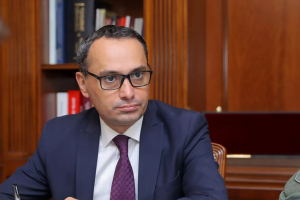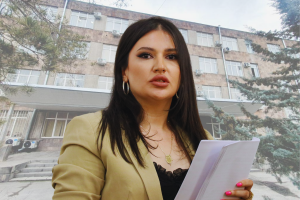At the Anti-Corruption Civil Court, under the chairmanship of Judge Karapet Badalyan, the court session continued regarding the case of forcible confiscation of allegedly illegally obtained property and monetary assets of former MP Mher Sedrakyan and his family.
It should be noted that all representatives of the respondents in this case objected to video recording and photographing of the session, however, the court partially satisfied the submitted motion.
According to Iravaban.net’s report, at the beginning of the session, lawyer Aleksan Khachatryan presented a motion to lift the securing measure for one of the properties belonging to respondent Shushanik Afyan.
Prosecutor Hamlet Harutyunyan from the Department for Cases of Forcible Confiscation of Illegally Obtained Property asked whether that property was prohibited from disposal as joint property. The lawyer said that Shushanik Afyan’s name was mentioned in the court decision and also presented the corresponding document.
The presiding judge announced that a decision regarding the motion would be made through a separate judicial act. The representative of third parties in the case also presented a motion to partially lift the securing measure, which concerned property belonging to “Bidek” LLC.
His second motion again concerned the disposal of another property of the company. He noted that by the decision of August 22, 2023, “Bidek” LLC was prohibited from alienating immovable and movable property owned by right of ownership.
The court will make decisions regarding these two motions in the form of separate judicial acts.
Lawyer Aleksan Khachatryan, representing respondents Mher Sedrakyan, Shushanik Afyan, and Davit Sedrakyan, said that the Constitutional Court decision established that property subject to confiscation is that which is connected to crime. He asked the plaintiff’s representative which of the demanded property and monetary assets are connected to crime, and if they are connected, what specific crime is being discussed, and whether there is any conviction judgment.
Hamlet Harutyunyan responded that the Constitutional Court did not specify in its decision that there must be an established conviction judgment, but rather stated that within the framework of implementing the goal of fighting crime, the competent body must show a probable connection between the attributed crime and the property with certain reliability.
“Regarding the connection to crime, I must note that the following has been recorded by us: On September 8, 2020, Mher Sedrakyan was involved as a defendant under Article 308, Part 2 of the former Criminal Code for the fact that he, during 1999-2008, being an official, head of Erebuni community, during 2004, with the assistance of community council members, abused his official powers, as a result of which he caused essential damage to the community,” Harutyunyan noted.
According to the prosecutor, during this period Mher Sedrakyan reached a criminal agreement with community council members, then with their assistance, based on corresponding decisions, alienated territories located at Sasuntsi Davit address, which were the property of Erebuni community, to his brother Vardan Sedrakyan.
“He alienated the complex for comprehensive service of transportation vehicles with an area of 544.45 hectares and metal coverings with an area of 248 square meters, as well as land area of 5,600 square meters for 1 million 550 thousand drams to ‘Davit-Artak Partners’ LLC, located in the same (Vardavar) park territory,” he said.
In addition, as presented in the documents, Sedrakyan alienated an 18 square meter building with 5,890 square meters of service land for 108,000 drams to his son Davit Sedrakyan.
According to the prosecutor, a total of approximately 12,035.5 square meters of land area was removed from the community’s own fund and alienated.
“The actions attributed to Mher Sedrakyan implied economic benefit, since those territories that were removed from the community property mass entered the property mass of Mher Sedrakyan’s family: in one case the property was alienated to the brother, in one case to the son, in another case to the company, regarding which detailed facts have been presented,” Harutyunyan said, noting that besides this, as a result of this action, economic benefit was also obtained in other ways, for example, by obtaining allegedly illegal dividends for himself and family members from various companies.
The respondent’s representative inquired from what year they consider it possible to present a demand for property confiscation. The prosecutor responded that it was the time period when Mher Sedrakyan first held a position that requires submitting a declaration, and after that – 1995.
The lawyer also asked what the next step should be if a person is acquitted of the crime. Harutyunyan said that if the Constitutional Court considered that in the case of implementing the goal of fighting crime, only the goal of fighting crime would be present and could not be combined with the goal of fighting corruption, then in that case, the termination of the case on the basis of acquittal should serve as grounds for stopping the investigation: “Since the Constitutional Court says that these 2 goals can complement each other, coincide, I think this is also why the Constitutional Court did not recognize the regulation of Article 10, Part 3 of the law as contradicting the Constitution.”
The parties had a lengthy discussion regarding this position of the plaintiff’s representative. The respondents’ representatives did not accept the plaintiff representative’s claims regarding presenting a property confiscation lawsuit while pursuing 2 goals simultaneously.
Lawyer Rafayel Jhangiryan, representing respondent Davit Sedrakyan, asked the prosecutor whether they could accept that part of the property is connected to corruption, another part to the fight against crime. The latter said they could also accept it that way.
Regarding this claim by the prosecutor, the lawyer asked whether they could separate those properties. The latter said these are all the properties that were acquired in 2004 and are not justified by legal income.
Subsequently, the respondent side presented a motion to apply accelerated trial proceedings and reject the lawsuit. In this regard, the court noted that this case has not yet reached the trial phase, the burden of proof has not been distributed, the court cannot make any conclusion about whether it is necessary to hear the persons participating in the case, witnesses, and since they have not reached that phase, accelerated trial proceedings cannot be applied.
The motion was rejected, and the session was postponed.
Details in the videos.
















